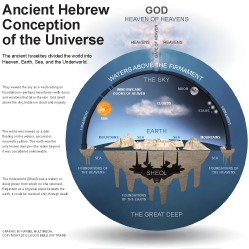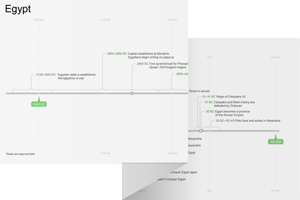37:1–50:26 The remainder of Genesis presents the story of Joseph and his brothers, as well as the episode of Judah and Tamar (Gen 38) and Jacob’s final words (ch. 49). Joseph’s story is the longest in the patriarchal narratives. It leads to Israel’s descent into Egypt in fulfillment of Yahweh’s announcement to Abraham (15:13). |
37:1–36 The first part of this chapter (vv. 1–11) gives the reasons for the animosity of Joseph’s brothers. The remainder (vv. 12–36) details their response to Jacob’s favoritism and what they perceive as Joseph’s youthful arrogance. |
37:2 the generations of Jacob This is the last such heading in Genesis (see 5:1 and note). Compare 35:22.
Joseph Jacob’s 11th son, the firstborn of his favorite wife, Rachel (30:24–25).
a bad report of This is the first cause of strife between Joseph and his brothers; others are presented throughout the chapter.
37:3 more than all his sons Jacob’s favoritism is understandable in the context of Joseph’s birth: Joseph was the firstborn of Rachel—Jacob’s first love—after years of barrenness. However, Jacob seems to have made no attempt to hide this favoritism from Joseph’s siblings.
a robe with long sleeves The meaning of the Hebrew phrase used here, kethoneth passim, is uncertain. It also appears in 2 Sam 13:18–19, but without any description. While it is clear that Joseph’s robe set him apart from his brothers—likely indicating his favored status—it is not clear what set it apart. It could have had long sleeves, been made of expensive material, or been a robe of many colors. The idea that the robe had many colors derives from the way the Septuagint (the ancient Greek translation of the ot) translates kethoneth passim. Regardless of its appearance, the robe distinguishes Joseph from his brothers and possibly indicates a position of authority over them.
37:4 they hated him Jacob’s undisguised favoritism causes Joseph’s brothers to loathe Joseph.
37:5 Joseph dreamed a dream Dreams were considered a common means of divine communication in the ot and throughout the ancient Near East (Gen 20:3; 28:12; 31:10–11). Particular dreams, like those Joseph has, were also believed to be prophetic.
were considered a common means of divine communication in the ot and throughout the ancient Near East (Gen 20:3; 28:12; 31:10–11). Particular dreams, like those Joseph has, were also believed to be prophetic.
they hated him even more It is difficult to know whether Joseph baits his brothers with a dream that symbolically depicts them as subservient to him, or whether he simply fails to discern their hatred.
37:7 This dream probably refers to Joseph’s rise to power in Egypt and his brothers being forced to come to him in order to survive (chs. 42–46). |
my sheaf stood up and it remained standing. Then behold, your sheaves gathered around and bowed down to For this dream’s fulfillment, see 42:6 and 42:9.
37:8 they hated him even more The narrator writes that Joseph’s brothers hated him three times (vv. 4, 5, 8). This repetition frames the evil actions Joseph’s brothers will later commit against him.
37:9 the sun and the moon and eleven stars This probably refers to Joseph’s entire family, as a unit. The sun is a reference to Jacob, while the moon could be Bilhah or Leah—Rachel, Joseph’s mother, was already deceased, making Bilhah, Rachel’s servant, his stepmother (v. 10) and Leah the chief wife. The 11 stars refers to Joseph’s 11 brothers. While Joseph’s dream is not literally fulfilled—Jacob is never recorded as bowing down to Joseph—it is in essence when the entire family becomes dependent on Joseph (chs. 42–46).
37:11 his father kept the matter in mind Jacob has no doubt learned of Joseph’s first dream; its repetition in v. 9 establishes both its authenticity and certainty. Despite his rebuke in v. 10, Jacob leaves open the possibility of the dream’s future fulfillment.
37:13 let me send you to them See note on v. 5.
37:14 at Shechem The distance from Hebron to Shechem was about 50 miles, probably at least five days on foot.
37:15 a man The identity of this man is unknown. The overall mystery of the sequence and wording is reminiscent of the event when Jacob wrestled a man who turned out to be a divine being (32:24–32; see note on 32:24).
37:16 Tell me, please, where they are pasturing Either the notorious reputation of Jacob’s sons—particularly around Shechem (see ch. 34)—or the size of their flock makes them immediately recognizable.
37:17 to Dothan Roughly 15 miles north of Shechem.
37:20 the pits Referring to human-made containers for storing water.
The Hebrew word bor means “cistern.” Ancient Israelites cut cisterns out of solid rock to gather and store water during the rainy season. Many cisterns have been found in Israel, some of which are quite large and deep (over 20 feet). Genesis 37:24 also clarifies that the “pit” was a cistern for catching water. |
37:21 We must not take his life Reuben’s motive for intervening is unknown. As the oldest, he may have assumed that he would be held responsible for anything that happened to Joseph.
37:23 the robe with long sleeves See note on v. 3.
37:25 a caravan of Ishmaelites This is a problematic phrase since these Ishmaelites are said to sell Joseph to Potiphar (39:1). Elsewhere, it is Midianite traders who take Joseph from his brothers (v. 28) and sell him to Potiphar (v. 36).
37:26 Judah The fourth oldest of the 12 sons of Jacob and son of Leah (29:35).
37:28 Midianite traders See note on v. 25.
twenty pieces of silver Since this is the average price for a slave according to the laws of Hammurabi (18th century bc), this figure may date the patriarchal narratives. However, slave prices varied depending on the age and sex of the slave, so the value of this figure for dating the stories is uncertain.
37:29 he tore his clothes A gesture signifying mourning. It seems that Reuben thought Joseph was dead. His brothers were not at the pit when he returned to it (v. 30). Compare v. 34.
37:30 Now I, what can I do Reuben’s grief arises either from the knowledge that he has no means of redemption with his father or from the responsibility he feels as the oldest for the well-being of his brothers.
37:31 dipped the robe in the blood Insinuates Joseph’s death (see v. 33).
37:32 they sent the robe with long sleeves The brothers send the robe to Jacob instead of taking it to him, creating the impression that others had found it.
37:35 mourning The Hebrew term used here, she’ol, occurs for the first time in the ot here. It refers to the realm of the dead (or the underworld), the grave, or death itself.
 Old Testament Theology of the Afterlife
Old Testament Theology of the Afterlife
37:36 Potiphar This same name occurs in the Hebrew text of the Joseph narrative later but as two words: poti phera' (41:45, 50) in reference to Joseph’s father-in-law. While the names probably do not identify the same person, they may share the same derivation. Potiphar means “he whom Ra has given” (pa-di-pa-ra in Egyptian).
The final element in the name (ra) is the name of the sun god whose primary center was at On (Heliopolis). Joseph’s father-in-law (Potiphera) is said to have been a priest at this religious center (41:45). However, this Egyptian name form does not occur in Egyptian sources before the 19th Dynasty of Egypt (ca. 13th century bc) although it reflects an evolution from name forms used in earlier periods, possibly as early as the Middle Kingdom (circa 20th to 17th century bc). Compare note on 41:14–57.

|
About Faithlife Study BibleFaithlife Study Bible (FSB) is your guide to the ancient world of the Old and New Testaments, with study notes and articles that draw from a wide range of academic research. FSB helps you learn how to think about interpretation methods and issues so that you can gain a deeper understanding of the text. |
| Copyright |
Copyright 2012 Logos Bible Software. |
| Support Info | fsb |
 Loading…
Loading…

 Cistern
Cistern 

